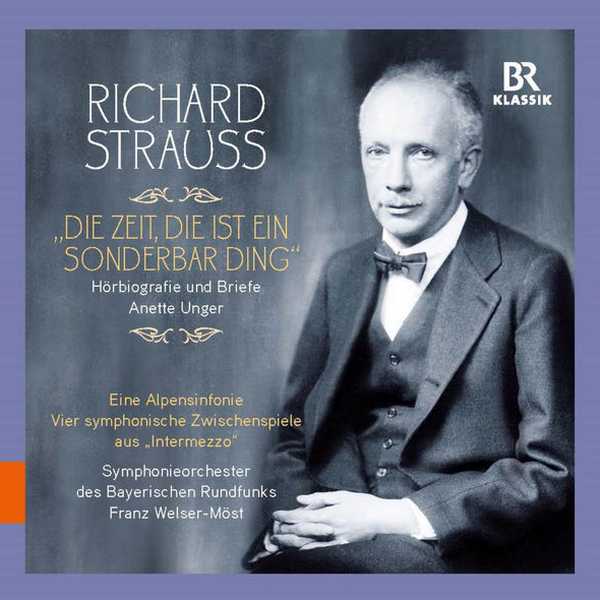
Composer: Richard Strauss
Orchestra: Symphonieorchester des Bayerischen Rundfunks
Conductor: Franz Welser-Möst
Number of Discs: 3
Format: FLAC (tracks)
Label: BR Klassik
Catalogue: 900905
Release: 2014
Size: 753 MB
Recovery: +3%
Scan: cover
CD 01
Eine Horbiografie: Richard Strauss
01. Part I: Auf der Suche nach dem kunstlerischen Ich (1864–1894)
02. Part II: Auf der Hohe des Ruhms (1894–1924)
03. Part III: Auf den Spuren verflossener Ideale (1925–1949)
CD 02
01. Erste Musikerfreundschaft: An Ludwig Thuille
02. Berliner Luft: An die Mutter
03. Lehrling in Meiningen: An Hans von Bulow
04. Jugendliebe: An Dora Wihan-Weis
05. Fortschritte in der Orchesterbehandlung: An den Vater
06. Dirigieren in Bayreuth: An Cosima Wagner
07. Unglucklich in Weimar: An Engelbert Humperdinck
08. Umzug nach Berlin: An die Mutter
09. Urheberrecht und Tantiemen: An Eugen Spitzweg
10. Auf Amerika-Tournee: An die Eltern
11. Vor der “Salome” Urauffuhrung: An Ernst von Schuch
12. Verstandlichkeitsprobleme: An Hugo von Hofmannsthal
13. Eine neue Kunstgattung: An Hermann Bahr
14. Zum Tod von Hofmannsthal: An Gerty von Hofmannsthal
15. Uber deutsche Spielplane: An Otto Laubinger
16. Der judische Librettist: An Stefan Zweig
17. Deutschland in Trummern: An Christian Strauss
18. Letzte Tournee: An Christian Strauss
19. Kontroverse: An Willi Schuh
20. Der “Griechische Germane”: Letzter Tagebucheintrag
CD 03
Eine Alpensinfonie, Op. 64
01. Nacht (Night)
02. Sonnenaufgang (Sunrise)
03. Der Anstieg (The Ascent)
04. Eintritt in den Wald (Entry into the Wood)
05. Wanderung neben dem Bache (Wandering by the brook)
06. Am Wasserfall (At the Waterfall)
07. Erscheinung (Apparition)
08. Auf blumigen Wiesen (On Flowering Meadows)
09. Auf der Alm (On the Alpine Pasture)
10. Durch Dickicht und Gestrupp auf Irrwegen (Straying through Thicket and Undergrowth)
11. Auf dem Gletscher (On the Glacier)
12. Gefahrvolle Augenblicke (Dangerous Moments)
13. Auf dem Gipfel (On the Summit)
14. Vision
15. Nebel steigen auf (Mists rise)
16. Die Sonne verdustert sich allmahlich (The Sun gradually darkens)
17. Elegie
18. Stille vor dem Sturm (Calm before the Storm)
19. Gewitter und Sturm, Abstieg (Thunder and Storm, Descent)
20. Sonnenuntergang (Sunset)
21. Ausklang (Final Sounds)
22. Nacht (Night)
Intermezzo, Op. 72: Four Symphonic Interludes
23. I. Reisefieber und Walzerszene
24. II. Traumerei am Kamin
25. III. Am Spieltisch
26. IV. Frohlicher Beschluss
Today Richard Strauss is still one of the most-performed composers from the epoch just before the modern age. In operas such as “Elektra” and “Salome” as well as in his tone poems, the composer made masterly use of established traditions, placing them brilliantly into new contexts and also pointing the way ahead especially where musical theatre was concerned. The Munich-born Strauss was a fine conductor, a brilliant man of letters, an advocate of artists’ rights, especially of those who had fallen foul of the authorities during dark times, and a musical politician, and his colourful personality continues to fascinate a large following today. For the Strauss year of 2014, in a new audio biography from the BR-KLASSIK series, Anette Unger traces the life of this extraordinary and multifaceted artistic personality. This exciting audio biography is further enhanced by selected letters written to family members and such famous contemporaries as Hans von Bülow, Cosima Wagner, Stefan Zweig and Hugo von Hofmannsthal, giving us a vivid impression of an artist who, in addition to his success as a composer, was always an astute observer of his times. On a third CD, the audio biography also features recordings made with Franz Welser-Möst, who has been a welcome guest conductor with the Symphonieorchester des Bayerischen Rundfunks for 25 years now. A special focus is placed on the tone poem and the opera, two of the most important genres in Strauss’s oeuvre, with recordings of “An Alpine Symphony”, composed in 1915, and the four symphonic interludes from the opera “Intermezzo” (1924).